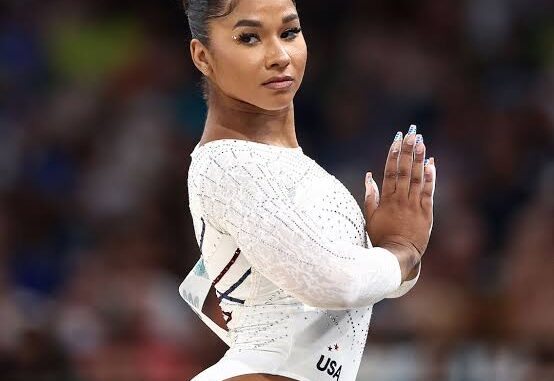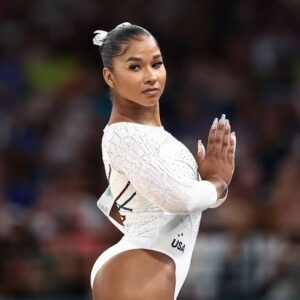
Jordan Chiles Takes Legal Battle to Swiss Supreme Court Over Olympic Bronze Controversy
October 2024 — Paris, France
American gymnast Jordan Chiles, who was a pivotal member of the gold-medal-winning U.S. women’s gymnastics team at the 2024 Paris Olympics, is now embroiled in a bitter legal dispute over a bronze medal that slipped through her fingers in the individual women’s floor event. Chiles, aged 23, has appealed to the Federal Supreme Court of Switzerland after the Court of Arbitration for Sport (CAS) rejected her claims for a second time, upholding a decision that awarded the bronze medal to Romania’s Ana Barbosu.

The saga began in the final rounds of the 2024 Olympic gymnastics competition when Chiles, after initially placing fifth, saw her score adjusted following an inquiry regarding the difficulty level of her routine. This change momentarily catapulted her into third place, ahead of Barbosu. However, in a dramatic twist, the Romanian team lodged a successful appeal with CAS, arguing that the U.S. inquiry had been filed four seconds past the one-minute deadline stipulated by the International Gymnastics Federation (FIG). CAS ruled in favor of Barbosu, and the medal was subsequently awarded to her, igniting a storm of controversy and public outcry in the gymnastics world.
A Bronze Medal Lost to Technicalities
The floor event in question was fiercely contested, featuring some of the top gymnasts in the world. Chiles, who was riding high after her success in the team event alongside her more famous teammate Simone Biles, delivered a powerful routine that many believed had earned her a rightful place on the podium. Initially, Chiles’ routine was given a lower difficulty rating than expected, leaving her in fifth place. However, the U.S. coaching team swiftly filed an inquiry, requesting a reevaluation of her routine’s difficulty score.
After reviewing the routine, officials adjusted the score, acknowledging a higher difficulty rating, and Chiles’ score was increased enough to place her in third, ahead of Barbosu by a slim margin. The American team celebrated the turnaround, with Chiles momentarily basking in the glory of securing a second Olympic medal to go alongside her gold from the team event. However, the celebrations were cut short.
The Romanian team, led by Barbosu’s coach, challenged the timing of the U.S. inquiry, citing the FIG’s one-minute window for filing such reviews. According to Barbosu’s team, the U.S. inquiry had been lodged four seconds late, a claim which, after being taken to CAS, was deemed valid. CAS ruled in favor of Barbosu, stripping Chiles of her bronze medal and awarding it to the Romanian gymnast instead.
The CAS Controversy: Bias Allegations and “Outrageous Statements”
The CAS ruling sent shockwaves through the gymnastics community, with many expressing outrage over what they considered a highly technical and pedantic decision that undermined the spirit of fair competition. Adding fuel to the fire were reports in U.S. media suggesting potential conflicts of interest within CAS. These reports claimed that the head of the panel responsible for the decision had personal or professional ties to Romania, raising questions about the impartiality of the ruling.
Though CAS swiftly responded to the allegations, calling them “outrageous statements” and firmly denying any bias, the controversy deepened, with Chiles’ legal team highlighting the broader issue of transparency in CAS rulings. In their appeal to the Swiss Federal Supreme Court, Chiles’ lawyers argue that CAS unfairly dismissed key evidence, including video footage that, according to them, “unequivocally proves” that the U.S. inquiry was submitted within the permitted time.
“We have reason to believe that the decision made by CAS was not only hasty but did not take into account crucial evidence that could have altered the outcome,” a representative of Chiles’ legal team stated. “We are confident that the Federal Supreme Court of Switzerland will ensure a fairer, more transparent review of the case.”
The Swiss Federal Supreme Court rarely overturns CAS decisions, as CAS is regarded as the highest sporting legal authority globally. Nevertheless, Chiles’ team remains determined to seek justice through the highest legal channels available, with the gymnast herself resolute in her pursuit of what she believes is her rightful place on the podium.
The Emotional Toll: Chiles Speaks Out
Jordan Chiles has largely remained focused and professional throughout her ordeal, but in recent weeks, she has spoken publicly about the emotional toll this ongoing dispute has taken on her. In a heartfelt interview with a major U.S. network, Chiles opened up about the challenges of navigating such a high-stakes legal battle in the public eye.

“This has been one of the hardest things I’ve ever had to go through,” Chiles said. “I love gymnastics, and I know that we’re all competing at the highest level where every little detail counts. But to lose a medal this way, over a matter of seconds, feels really unfair. I’ve worked my whole life for this moment, and it’s hard to accept that it could all come down to something that, in my heart, doesn’t feel like justice.”
Chiles also revealed that she has been the target of online harassment since the CAS ruling, including a flood of racist abuse on social media. She shared screenshots of hateful messages that ranged from derogatory comments about her race to insults about her performance, sparking a wider conversation about the mistreatment of athletes, particularly women of color, in the digital age.
“It’s really sad that we still live in a world where this happens,” Chiles said. “At the end of the day, I’m just a gymnast. I go out there, I do my best, and I try to make my country proud. I never thought that standing up for myself would lead to this kind of backlash.”
The support for Chiles has been overwhelming, with fellow gymnasts, athletes, and fans rallying behind her. Simone Biles, Chiles’ teammate and one of the most decorated gymnasts of all time, took to social media to express solidarity. “Jordan is a fighter, and we all know she deserved that medal,” Biles wrote in a tweet. “She’s handling this with grace, but the system needs to change.”
The Broader Implications: Fairness in Gymnastics Judging
The Chiles-Barbosu dispute has raised broader questions about the fairness and consistency of judging in gymnastics, particularly when it comes to the handling of inquiries and the strictness of deadlines. Gymnastics is a sport where the smallest margins can make the difference between winning and losing, but critics argue that too often, the rules are applied in ways that are arbitrary or overly rigid.
Many within the gymnastics community have voiced concerns that FIG’s one-minute inquiry rule, while intended to maintain order during competitions, can lead to unjust outcomes when applied too strictly. “We need to look at how we balance the need for rules with the need for fairness,” said one prominent gymnastics coach. “If an inquiry is submitted just a few seconds late, but it’s valid and affects the outcome, it should be considered. We’re talking about athletes who train for years for this one moment.”
The FIG, for its part, has remained largely silent throughout the ongoing dispute between Chiles and Barbosu. In a brief statement, FIG reiterated its commitment to fairness and transparency in judging but declined to comment on the specifics of the case, citing the ongoing legal proceedings.
What Lies Ahead for Chiles?
As Jordan Chiles awaits the outcome of her appeal to the Swiss Federal Supreme Court, her future in gymnastics remains uncertain. The appeal process could take several months, and even if the court sides with her, there is no guarantee that she will ultimately be awarded the bronze medal. Still, Chiles has made it clear that her fight is about more than just a piece of hardware.
“This is about standing up for what’s right,” she said. “It’s about making sure that all athletes are treated fairly and that we’re not penalized for something that was beyond our control. I’m going to keep fighting for that, no matter how long it takes.”

For now, Chiles continues to train and stay focused on her career, with her sights set on future competitions and possibly the 2028 Olympics in Los Angeles. Whether or not she stands on the podium again in the near future, she has already won the admiration of fans around the world for her courage, resilience, and unwavering commitment to justice.
A Potential Shift in Sporting Legal Precedents?
Should Chiles’ appeal be successful, it could set a significant precedent for how future disputes in international sports are handled, particularly when it comes to the role of CAS and its decisions. Legal experts have noted that while it is rare for the Swiss Federal Supreme Court to overturn a CAS ruling, it is not unheard of.
“The Federal Supreme Court typically defers to CAS on sporting matters, but there have been cases where procedural fairness has been called into question,” said a Swiss legal expert familiar with the case. “If Chiles’ lawyers can prove that key evidence was overlooked or that the inquiry was submitted in time, there’s a chance the decision could be reversed.”
In the meantime, the gymnastics world waits with bated breath to see how the legal battle will unfold, with many hoping for a resolution that not only honors the rules but also the spirit of fair competition that the Olympics is supposed to embody.
Leave a Reply